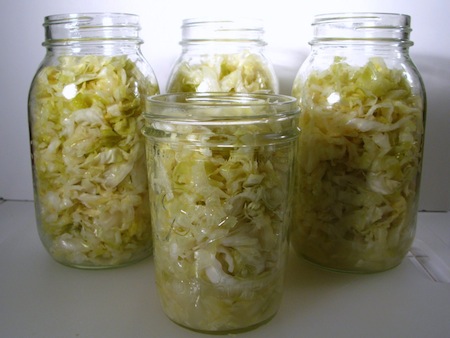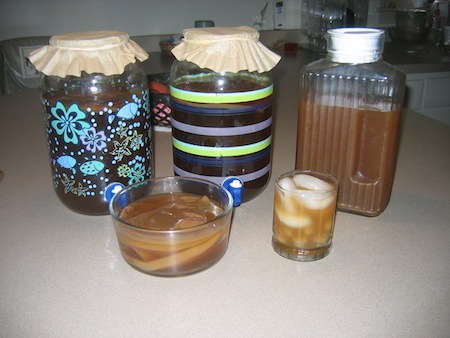Three Fermented Foods Everyone Should Know About
When we say fermentation many people immediately think of beer, wine, or spirits. But, have you heard of fermented foods?
You’re probably familiar with cheese, yoghurt, and even cultured butter. These are great examples of fermented foods, that most people would use on a daily basis – in this case, they are all dairy products, but fermentation isn’t just for dairy and alcohol!
Most traditional cultures have some form of fermented food[1]. These are foods that have been made easily digestible, and more nutritious, by the action of enzymes and other pro-biotic micro organisms. In a sense, these micro organisms do part of the digestion for us – they break down things like cellulose, that we can’t digest, and release important short chain fatty acids, like butyric acid, that are important for healthy bowel function[2],[3].
In our clinic, we find that fermented foods can be very important for people with inflammatory bowel disease and ulcerative colitis. Not only is the butyric acid from these foods protective of mucous membranes in the colon[3], but the predigestion of the normally indigestible fibre makes fermented foods less damaging to an already inflamed bowel.
While yoghurt is one fermented food that many people may already consume, it is just the tip of the iceberg. Try including these three options into your diet for additional diversity.
Sauerkraut
 Fermented cabbage is one of natures finest fermented vegetables and widely spread throughout Europe. Photo credit I Believe I Can Fly
Fermented cabbage is one of natures finest fermented vegetables and widely spread throughout Europe. Photo credit I Believe I Can FlySauerkraut in Germany, kiseli kupus in Croatia and choucroute in France – fermented cabbage is one of nature’s finest fermented vegetables and widely spread throughout Europe. Used in many traditional recipes if you’ve never had Serbian Sarma you don’t know what you’ve been missing!
Sauerkraut is produced when cabbage is preserved with lactic acid and is generally high in lactobacillus brevis and lactobacillus plantarum. These two species of probiotic are often used for improved immune function and treatment of intestinal dysbiosis.
Sauerkraut is also high in Vitamin C and is a great vegetarian source of acetylcholine[4]. This makes sauerkraut:
- a great food based antioxidant,
- a powerful immune support,
- and a good daily food for people with high blood pressure.
Just make sure your sauerkraut is unpasteurized, as the heat treating in pasteurisation will kill the beneficial microorganisms.
Sauerkraut can be enjoyed just like coleslaw and in fact has a very similar taste. The enzymes present in sauerkraut make it a great addition to help with the breakdown and digestion of other foods.
Miso
 Miso is the king of fermented bean products. Photo credit kattebelletje
Miso is the king of fermented bean products. Photo credit kattebelletjeNormally, we’re not the biggest fans of soy, or other legumes for that matter! Full of phytates, enzyme inhibitors, and lectins, a diet high in soy and other legumes is a sure fire way to develop a whole range of nutrient deficiencies and intestinal problems.
Fermentation, however is the answer to this. Fermentation of bean and legume products de-activates phytates and other anti-nutrients resulting in a final product that is both digestible and nutritious.
Miso, is the King of fermented bean products. Produced from soaked, cooked, and mashed soy beans that have been completely overgrown with mold – miso is a beautiful savoury paste that is high in amino acids and deserving a place in everyone’s diet.
Miso contains the amino acid tryptophan, an important amino acid to improve mood and happiness. Additionally, a diet containing the isoflavones found in miso is associated with a lower risk of hormonally driven cancers, such as some forms of breast cancer – interestingly this effect as only seen based on the consumption of miso, and not unfermented soy products.[5]
Miso makes a great flavouring for soups, and a base for stocks and sauces. Traditionally miso is added after cooking, and this in fact helps prevent heat related damage to the micro organisms.
Kombucha
 Kombucha is one of my favourite fermented products. Photo courtesy of Todd Slater
Kombucha is one of my favourite fermented products. Photo courtesy of Todd SlaterOkay, so Kombucha isn’t really a food, but it is definitely one of my favourite fermented products! Just like a sparkly apple cider, kombucha is one of the most refreshing drinks I can think of.
Promoted by many as a panacea for all ills, kombucha is made from black tea that has been fermented by a symbiotic colony of molds and yeasts. The health benefits of kombucha are controversial, once a common home remedy it fell into disfavour, however in the 10–15 years it has been making a come back. Now, kombucha can be readily found in health food shop and at organic markets.
Like all fermented products, the therapeutic properties of kombucha are largely determined by the specific strains of microorganisms and the concentration of metabolites in the end product. Recent research has shown that kombucha may:
- help restore function of damaged pancreatic cells in diabetes[6]
- help to protect the liver[7] from many common toxic products including paracetamol[8]
Almost even more importantly in an age of growing anti-biotic resistance, kombucha has been shown to exert anti-microbial activities against many common microbes.[9]
Kombucha is becoming more and more readily available and can be found in many health food shops and organic markets. For the adventurous, you can even brew your own kombucha at home exceptionally easily. Be very careful to ensure your preparation methods are hygienic as contamination of the brew or culture can result in allergic retains, sickness, and even liver damage.
- Hunter, BT., Probiotic Foods for Good Health: Yogurt, Sauerkraut, and Other Beneficial Fermented Foods. Laguna Beach, 2008
- D’Argenio, G., et al. Butyrate enemas in experimental colitis and protection against large bowel cancer in a rat model. Gastroenterology. 110(6):1727–1734, 1996.
- Topping, D. L. Short-chain fatty acids produced by intestinal bacteria. Asia Pacific Journal of Clinical Nutrition. 5:15–19, 1996.
- Rawlings D., Fermented Foods for Health: Use the Power of Probiotic Foods to Improve Your Digestion, Strengthen Your Immunity, and Prevent Illness. Fair Winds Press.
- Yamamoto, S., et al. Soy, isoflavones, and breast cancer risk in Japan. Journal of the National Cancer Institute. 95(12):906–913, 2003.
- Semantee Bhattacharya, Ratan Gachhui, and Parames C Sil. Effect of kombucha, a fermented black tea in attenuating oxidative stress mediated tissue damage in alloxan induced diabetic rats.. Food Chem Toxicol, 60C:328–340, Jul 2013.
- Semantee Bhattacharya, Ratan Gachhui, and Parames C Sil. Hepatoprotective properties of kombucha tea against tbhp-induced oxidative stress via suppression of mitochondria dependent apoptosis.. Pathophysiology, 18(3):221–234, Jun 2011.
- Yong Wang, Baoping Ji, Wei Wu, Ruojun Wang, Zhiwei Yang, Di Zhang, and Wenli Tian. Hepatoprotective effects of kombucha tea: identification of functional strains and quantification of functional components. Journal of the Science of Food and Agriculture, page n/a–n/a, 2013.
- D D Cetojevic-Simin, G M Bogdanovic, D D Cvetkovic, and A S Velicanski. Antiproliferative and antimicrobial activity of traditional kombucha and satureja montana l. kombucha.. J BUON, 13(3):395–401, Jul-Sep 2008
